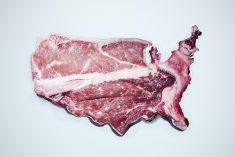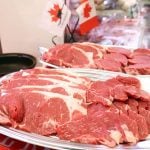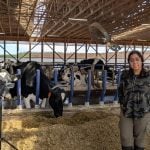The U.S. Senate and House of Representatives have both approved a repeal of the government’s six-year old mandatory country-of-origin labelling (COOL) laws on beef and pork.
Tucked into an omnibus appropriations bill put before Congress Friday, the repeal shuts the door on a major irritant in North American trade relations and is expected to curb U.S. processors’ COOL-related discounts on imported Canadian cattle, hogs, beef and pork.
The bill now goes to President Barack Obama for his signature, and Canadian officials said Friday he plans to sign it.
Read Also

U.S. grains: Soy futures set 15-month high after China agrees to purchases
U.S. soybean futures reached a 15-month high on Thursday after President Donald Trump’s administration said top-importer China agreed to buy tens of millions of tons of American crops in the next few years as part of a trade truce.
Canada’s Trade Minister Chrystia Freeland, on a conference call Friday from unrelated World Trade Organization (WTO) ministerial meetings in Nairobi, described the repeal as “a great day for the Canada/U.S. relationship, and a great day for the Three Amigos of NAFTA.”
The repeal follows six years of COOL challenges and U.S. appeals at the WTO, which pitted the U.S. against the other Two Amigos of the North American Free Trade Agreement, Canada and Mexico, and ended earlier this month with a WTO panel approving set levels of retaliatory tariffs that Canada and Mexico could impose on U.S. goods.
Canada will still go to the WTO Monday to seek approval to levy retaliatory tariffs, Freeland said, describing the move as “an important procedural step in the WTO process.”
Retaliation approval from the WTO had been expected earlier but was delayed, due mainly to the Nairobi ministerial meetings, she said.
While Canada is glad for the repeal, the “actual (trade) obstacles, as of the moment we are speaking, haven’t been removed… we think it is prudent of us to take the process to its final, technical conclusion, and that’s what we’re going to do.”
Canada’s Agriculture Minister Lawrence MacAulay said Friday the government will still “actively monitor to ensure that the incentives to discriminate against Canadian cattle and hogs are quickly removed from the marketplace.”
However, he added, he expects the repeal to restore normal cross-border beef, pork and livestock trade “quite shortly.”
Asked on the call whether the repeal would also remove COOL on Canadian sheep and lamb, Freeland said the WTO complaint specifically applied to the beef and pork sectors, where Canada “had a very significant trading case to make.”
MacAulay said his understanding was that the repeal applies to beef and pork, and any remaining COOL issues on Canadian product would be dealt with later. COOL since 2009 has also applied to imports of fish, shellfish, fresh and frozen fruits and vegetables and certain nuts.
Challenging COOL “has been a long and expensive fight for Canadian producers,” Canadian Pork Council chair Rick Bergmann said in a separate release Friday. “We look forward to (Obama) signing the bill to avoid retaliatory action and closing the book on this dispute.”
U.S. Vice-President Joe Biden on Friday hailed the overall bill, saying it “averts another unnecessary government shutdown, and lays a path forward to the type of governing by consensus that the American people deserve and expect.”
Philip Ellis, president of the U.S. National Cattlemen’s Beef Association, said Friday that COOL has “plagued our industry for many years now, costing us millions and driving us to the brink of retaliation from two of our largest trading partners. Cattle producers have had to bear the cost of this failed program for far too long.”
The NCBA and National Pork Producers Council noted the Republican chairs of the U.S. Senate and House agriculture committees, Sen. Pat Roberts and Rep. Michael Conaway, and California Democrat Rep. Jim Costa were key in getting COOL repeal language added to the omnibus spending bill.
“America’s pork producers are grateful that lawmakers, particularly Chairman Roberts and Chairman Conaway, recognized the economic harm we faced from retaliation because of the WTO-illegal COOL law,” NPPC president Ron Prestage said in a separate release.
“I know tariffs on U.S. pork would have been devastating to me and other pork producers.”
Before the bill’s passage, Bill Bullard, CEO of U.S. ranchers’ group R-CALF USA, a long-time proponent of COOL, urged Congress to pull the COOL language or, failing that, for Obama to veto the bill.
U.S. cattle producers, he said, “cannot compete in the global marketplace if consumers cannot distinguish their beef from the beef imported by multinational meatpackers from the 14 countries that currently ship beef into the United States.”
COOL, in place in the U.S. since 2009, was ruled out of order by the WTO’s Dispute Settlement Body (DSB) in 2011 and WTO Appellate Body in 2012 for discriminating against Canadian and Mexican livestock and meat.
The U.S. in 2013 revised the COOL law, tightening its requirements for information on where animals were born, raised and slaughtered, in response to the WTO’s criticism that the law “does not fulfil its legitimate objective” of consumer education.
A WTO compliance panel last year ruled the U.S. changes didn’t make COOL WTO-compliant, leading to hearings over the allowable level of retaliatory tariffs Canada and Mexico could impose without a repeal. — AGCanada.com Network












